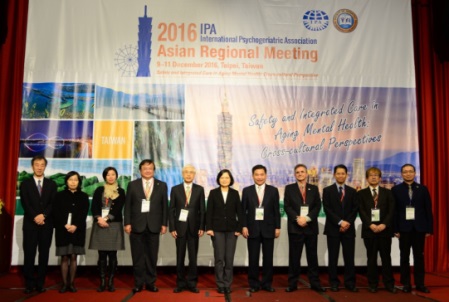IPA Asian Regional Meeting Update
The International Psychogeriatric Association Asian Regional Meeting (IPA-AR), which was held in Taipei, Taiwan from 9-11 December 2016, brought together more than 400 delegates from 24 countries. Each participant contributed a unique set of experiences and expertise, but all shared a common interest in geriatric psychiatry. On behalf of the Organizing Committee, co-chaired by Drs. Te-Jen Lai (Taiwan) and Masatoshi Takeda (Japan), and the Scientific Committee, co-chaired by Drs. Tzung-Jeng Hwang (Taiwan) and Manabu Ikeda (Japan), we are pleased to share highlights and news from the event, which focused on the theme “Safety and Integrated Care in Aging Mental Health: Cross-cultural Perspectives.”

“As the international community faces challenges in elderly healthcare, it is a great opportunity for Taiwan to bridge the whole world and introduce the most updated knowledge and skills, meeting the needs of aged healthcare.”
With her opening speech, President of Taiwan, Tsai Ing-wen kicked off the IPA-AR meeting. In her address, President Tsai cited current initiatives, such as Taiwan’s “10-year programme for long-term care version 2.0” and focus on preventive medicine. She also highlighted that the importance and urgency of addressing aging and psychogeriatric issues, particularly in the region.
Following President Tsai’s speech, IPA President Raimundo Mateos (Spain) and Organizing Committee Co-Chair Te-Jen Lai also give a welcome address to the audience.
Hosted by the International Psychogeriatric Association (IPA) and Taiwanese Society of Geriatric Psychiatry, in collaboration with multiple organizations from Hong Kong, Japan, Korea, China, Taiwan, and Thailand, the meeting served as a platform for international exchange, allowing our diverse participants to connect both personally and professionally.
Professionally, workshops, a tripartite meeting, a keynote and plenary lectures, symposiums, oral sessions, and poster presentations provided a range of opportunities for productive communication:
Two pre-meeting workshops on imaging and biomarkers, led by Prof. John O’Brien (United Kingdom), and clinical challenges in geriatric psychiatry, led by Prof. Geroge Grossberg (USA), allowed smaller groups of participants to actively engage in clinically significant issues.
A tripartite meeting provided an opportunity for invited experts from Hong Kong, China and Taiwan to discuss crucial topics, such as development of a new screening tool for dementia in Chinese society and potential cooperative projects in this region.
The keynote address was delivered by Professor Henry Brodaty (Australia), focusing on “Integrated Care and Safety Issues in the Aging Mental Health” and setting the stage for the meeting’s main focus.
Plenary lectures were given in four sessions, with Prof. Masatoshi Takeda (Japan) presenting on “Aging and Mental Health-strategy for Prevention against Cognitive Impairment of the Elderly,” Prof. Helen Chiu (Hong Kong) on suicide prevention, Prof. John O’Brien (United Kingdom) on “The Association between Vascular Factors and Cognitive Impairment and Depression,” Prof. Martha Sajatovic (United States) on old age bipolar disorder, and Prof. Kun-Ju Lin (Taiwan) on molecular imaging for dementia and depression.
Twelve symposia were moderated by members of the IPA and allowed multiple experts to present, in dialogue with each other on crucial, complex issues. Topics included:
- “Safety and Integrated Care in Aging Mental Health: Cross-cultural Perspectives”
- “Successful Ageing vs. Frailty in Exceptional Longevity: Centenarians’ Health and Well-being in Perspective”
- “New Technology in Psychiatry: NIRS and MRI Application on Geriatric Psychiatry”
- “Late-life Mood Disorders- Emerging Perspectives”
- “Lifestyle, Cognitive Function and Quality of Life in the Elderly”
- “Dementia of Lewy Bodies: Animal Model, Neuroimaging Findings and Sleep Disorder”
- “Frailty and Psychogeriatric Syndromes”
- “Transitions in Late Life Suicide”
- “Mental Capacity and Law”
- “Mild Cognitive Impairment: Diagnostic Stability, Biomarkers and Neuropsychiatric Predictors”
- “The Paradigms and Challenges of Psychogeriatric Service Delivery”
- "Frontotemporal Lobar Degeneration (FTLD) in Asia"
Six oral sessions provided researchers with the opportunity to concisely share their work, and were grouped by the following categories:
- “Neurobiological Studies in Mild Cognitive Impairment and Dementia”
- “Anxiety and Depression in Late Life”
- “Epidemiological Studies in Dementia”
- “Medical Morbidity and Cognitive Impairment in Psychogeriatric Patients”
- “Approaches to Cognitive Enhancement and Active Aging”
- “Burden, Support and Life Transformation of Caregivers Looking after Dementia Patients”
Poster presentations spanned a diverse set of topics, including dementia, mild cognitive impairment, Parkinson’s, anxiety, depression, suicide, schizophrenia, bipolar disorder, psychosocial interventions, caregiver issues, long-term care, service delivery, and ethics.
Personally, face-to-face interactions could be seen in virtually every corner of the meeting, with no minute wasted. Even during coffee breaks, enthusiastic exchanges of ideas could be seen and heard.
In addition, our gala dinner featured not only the rich, delectable cuisine of Taiwan, but also the vibrant, relaxed voices of participants from across the world singing karaoke together. By beginning the meeting with this and other events, we were able to establish a warm, collaborative environment, setting the stage for meaningful connections.
As people live longer and the societies around the world age, issues related to geriatric care are becoming more important than ever, especially those regarding mental health. This reality makes our work all the more urgent, our collaboration all the more necessary. We are con!dent that the meaningful networks created at the IPA-AR meeting will continue to flourish, advancing further psychogeriatric research and international initiatives. Through cross-cultural collaborations, members and affiliates of the IPA can work together to address critical issues, such as elderly suicide prevention, dementia, depression, anxiety disorder, bipolar disorder, and integrated aged care, improving the lives of
elderly, and their loved ones, worldwide.









